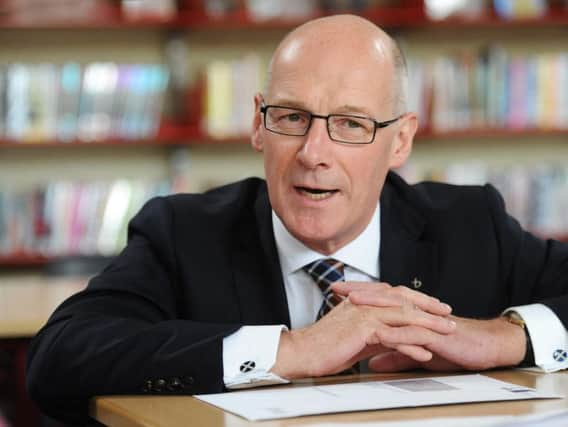Controversial P1 tests to continue with modifications, says John Swinney


But John Swinney said there would be "important modifications" made to the Scottish National Standardised Assessments (SNSA) undertaken by four and five-year-olds.A review of the use of the tests on P1 pupils was carried out after opposition parties joined forces to vote in favour of scrapping them.The Scottish Government commissioned literacy expert David Reedy to carry out the work.He concluded that P1 tests have the "potential to play a significant role in informing and enhancing teachers' professional judgments" about how pupils are performing.The review said the tests should be "continued with modification", including safeguards to prevent any "drift towards high stakes" testing.Mr Swinney said: "I do not suggest this review has delivered an unqualified green light to the Scottish Government in terms of P1 assessments."Clearly the review makes important recommendations about improvements."He added: "I accept that there is work to be done, but believe with the improvements proposed we can move forward in the correct direction."The assessments were introduced by the Scottish Government in 2017, as part of efforts to close the attainment gap, with youngsters being tested in P1, P4, P7 and S3.However, their use on the very youngest schoolchildren has been controversial, with unions claiming some youngsters had been reduced to tears during the testing process.Mr Swinney said he had been "reassured" that the review found only "scant evidence of children becoming upset when taking the P1 SNSA".The Scottish Government will now work to improve the guidance, support and training for teachers on how the assessments should be carried out.Ministers will also work with local councils, schools and others to develop a code of practice which sets out a detailed rationale for P1 assessments.Opposition politicians however insisted the tests should be halted.Conservative education spokeswoman Liz Smith said that the Education Secretary "has his head in the sand".The Tory MSP said: "He refuses to get the message that the Scottish Parliament voted to halt the P1 tests because all the opposition parties were listening to the concerns expressed by primary school teachers, parents and educational experts."They told us that the purpose of the tests was unclear and that there was no evidence that they provided any added educational benefit. What has been published today does not answer these basic concerns."Labour education spokesman Iain Gray said: "It remains an act of supreme arrogance for John Swinney to continue to defy the will of the Scottish Parliament."The Parliament said in September that testing Primary 1 pupils must end, yet the SNP Government continues to ignore that decision."The review reflects many of Parliament's concerns, including the lack of a clear rationale for the tests. "Liberal Democrat education spokesman Tavish Scott insisted: "This review is a stitch-up."Teachers, unions, parent groups and Parliament have all called for a halt to the testing of four and five year old boys and girls."But the Education Secretary wants them to continue, so he's commissioned a review that will prove himself right."He added: "Not only will there be an endless stream of new guidelines, the Government will impose a handy new eight-point action plan to guide teachers through the tests they've already made abundantly clear are worthless."General secretary of teaching union EIS, Larry Flanagan, said: "David Reedy's report, with its 28 recommendations for improvement, would seem to be a clear indication that Scottish Government got it wrong on P1 standardised assessments first time around."An EIS concern with even more guidance is the simple fact that in the first round of assessments 24 out of 32 Local Authorities set aside the guidelines they had been party to agreeing, leading to many of the problems which teachers reported."There is no great confidence that the Scottish Government can ensure compliance this time round when it failed so miserably in the past. The fact that some Local Authorities are continuing with additional standardised tests simply heightens EIS concerns in this regard."Mr Flanagan also added, "We do welcome confirmation that the assessments should be only used for diagnostic purposes and we will continue to monitor this aspect of their implementation."